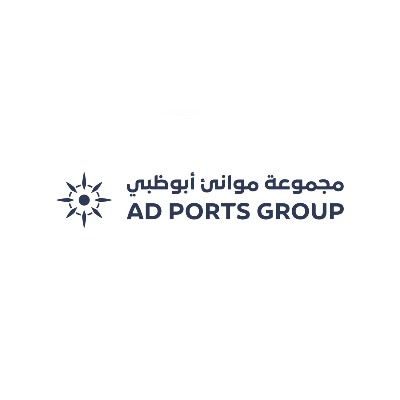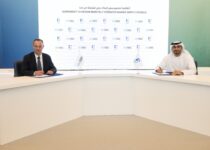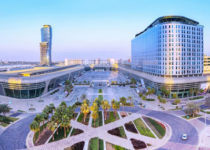AD Ports Group (ADX: ADPORTS), a leading facilitator of global trade, logistics, and industry, today announced its financial results for the 3 months ending 31stMarch 2024, reporting strong operational and financial performance, with revenue more than doubling Year-on-Year (YoY) to AED 3.89 billion, +22% YoY on a Like-For-Like (LFL) basis after adjusting for the effect of mergers and acquisitions (M&A). In Q1 2024, AD Ports Group completed the acquisition of APM Terminals Castellon in Spain, Sesé Auto Logistics in Europe, Karachi Gateway Terminal Multipurpose Limited (KGTML) in Pakistan, Dubai Technologies in the UAE, and GFS in the UAE.
Both Revenue and EBITDA growth were driven by the Maritime & Shipping, Ports, Logistics, and Digital Clusters, as well as M&A effect, particularly Noatum’s acquisition, which was completed on 30th June 2023, and GFS’ acquisition, which was completed on 31st January 2024.
The Group EBITDA margin of 26.7% is well within the 25-30% range guidance confirmed at the end of 2023 for the medium term.
Despite higher depreciation and amortisation charges (+64% YoY) as well as finance costs (+70% YoY) in Q1 2024, and M&A transaction costs, Profit Before Tax and Minorities grew by an impressive 27% YoY to AED 462 million, including AED 62 million dividend income from the Group’s 10% investment in National Marine Dredging Company (NMDC).
The introduction of corporate income tax in the UAE in 2024 and the higher share of profits coming from foreign operations (also taxable) resulted in Total Net Profit growth of 10% YoY to AED 400 million, and a Net Profit after Minorities of AED 314 million.
Revenues and profits associated with recent organic and inorganic investments are yet to be fully reflected in the Group’s financial performance going forward. Furthermore, normalisation of interest rates will also help narrow the gap between EBITDA performance and bottom-line growth.
Captain Mohamed Juma Al Shamisi, Managing Director and Group CEO, AD Ports Group, said: “We are pleased to have continued the momentum of a successful 2023 through the first quarter of 2024, delivering strong financial and operational results more than doubling our year-on-year revenues and recording healthy profits. This performance highlights our unwavering commitment to excellence and growth as a top player in global trade and logistics. Guided by the vision of our wise leadership, the Group is well structured and has built solid foundations to support the ongoing diversification of its port-centric logistics global footprint in light of the ongoing global geopolitical disruptions and polarisation. We are confident that with assets in Pakistan, Spain, Jordan, Egypt, Congo Brazzaville, Angola, Uzbekistan, Kazakhstan, Georgia, and the UAE, AD Ports Group is well-placed to benefit in today’s challenging markets.”
Operational Performance
Operationally, the Ports Cluster saw container throughput grow to 1.37millionTwenty-foot Equivalent Units (TEUs) in Q1 2024, +26%YoY, driven by higher overall utilisation of 55%compared to51% in Q1 2023 and 52% in Q4 2023. At Khalifa Port, which accounted for 88% of total throughput, utilisation at the two operational container terminals increased sharply to 62%, up from 55% in Q1 2023 and 56% in Q4 2023. On an LFL basis (adjusting for KGTL and Noatum), container volumes grew 14% YoY.
General cargo volumes rose by 36% YoYtoreach 13.4 million tonnes in Q1 2024, compared with 9.8 million tonnes in Q1 2023, largely driven by the consolidation of Noatum and KGTML.
Ro-Ro volumes increased by more than fourfold YoYto 307,000 vehicles in Q1 2024, including the consolidation of Noatum’s volumes, while cruise passenger volumes declined 8% YoY during the quarter due to the impact of the Red Sea disruptions on the Aqaba Cruise Terminal operations (+2% YoY in cruise passenger volumes in the UAE).
In the Economic Cities & Free Zones (EC&FZ) Cluster, 1.4sq km of additional new leases (net) were signed in Q1 2024. Occupancy in KEZAD Communities continued to improve, reaching 61% in the first quarter of 2024, up from 47% in Q1 2023 and 60% at the end of 2023. Demand for gas remained steady (-1% YoY), and warehouse occupancy improved further to 88%, up from 71% in Q1 2023 and 87% in Q4 2023.
In the Maritime& Shipping Cluster, all operational indicators recorded strong growth in Q1 2024. The total vessel fleet reached 263, up from 184 in Q1 2023, adding capacity across all businesssegments-Marine Services, Container, Bulk, Ro-Ro, and Offshore & Subsea.
With the consolidation of GFS effective 1st February 2024, AD Ports Group has become the world’s third largest feeder container shipping company by capacity, with a container vessel fleet of 49 and a total vessel fleet capacity of 139,000 TEUs.Maritime connectivity, a key element in the integrated supply chain ecosystem that has been nurtured in Abu Dhabi over the past few years, has leapfrogged with the acquisition of GFS, significantly strengthening the UAE Capital’s hub-and-spoke model with23 feeder services, connecting customers to 28 countries and 78 ports along key trade routes for Abu Dhabi.
Container volumes increased more than four-fold YoY to 450,000 TEUs in Q1 2024; and marine services activities (vessel calls, towing services, pilot services) all experienced mid-single digit growth YoY.
With its combined feeder container shipping operations, which include GFS, Safeen Feeders, and Transmar, AD Ports Group loaded one TEU every 14 seconds in Q1 2024.
In the Logistics Cluster, polymer volumes increased 34% YoY in Q1 2024, while global ocean and air freight forwarding volumes increased 13% YoY and declined 3% YoY, respectively. Ocean freight forwarding volume good performance was driven by a mix of organic growth, especially in Turkey, new customer acquisition following the deployment of new solutions, and favourable market dynamics. As for air freight forwarding volumes, price discussions with some existing customers exerted pressure on volumes.
In the Digital Cluster, Foreign Labour Services (FLS) transactions, external projects, and the start of security services (through Nishan Security Services) supported the operational performance of the cluster.
Financial Performance
The EC&FZ Cluster recorded revenue growth of 7% YoY to reach AED 461 million in Q1 2024, driven by warehouse leases and KEZAD Communities as utilisation rates in these two business segments continue to increase steadily.
The cluster’s EBITDA amounted to AED305 million for the quarter, translating into an EBITDA margin of 66%, compared to 68% in Q1 2023 and 63% adjusted for a one-off in Q4 2023.
The Ports Cluster’s revenue grew by 80% YoY to AED 565 million in Q1 2024, fuelled by strong growth of 55%, 115%, and 271% YoY in port leases, general cargo handling, and Ro-Ro handling. This growth was bolstered by the contribution of Noatum and KGTML in the general cargo business and Noatum in the Ro-Ro business while the continued ramp-up of South Quay and KPL at Khalifa Port supported strong momentum in the port leasing business. Additional container revenues, including that from the container terminal in Pakistan-Karachi (KGTL) and Noatum’s container activities in Spain, have further boosted the cluster’s top-line performance since Q3 2023. Adjusting for the M&A effect, consisting of Noatum Terminals business in Spain (3-month contribution) and Pakistan’s KGTL (3-month contribution) and KGTML (2-month contribution), Ports Cluster revenue increased by17% YoY in Q1 2024.
The cluster’s EBITDA reached AED 249 million in Q1 2024, implying an EBITDA margin of 44%, down from 55% in Q1 2023 and 45% in Q4 2023 due to the change in business mix from international activities.
In Q1 2024, the Maritime & Shipping Clustersustained a strong top line growth momentum, with revenue soaring 92% YoYto AED 1.76 billion in Q1 2024, driven by Marine Services (+384% YoY), Shipping (+90% YoY), and Offshore & Subsea (+48% YoY). Adjusted for M&A effect, 2-month contribution from GFS and 3-month contribution from Noatum Maritime, the Cluster’s revenue growth reached 27% YoY.
The Maritime & Shipping Cluster was the largest revenue and EBITDA contributor, accounting for 44% and 37% of the Group revenue and EBITDA, respectively. Additional investments were made in Offshore &Subseacapacity to continue to diversify the revenue mix and build a synergistic portfolio of assets less susceptible to fluctuating market dynamics.
The cluster’s EBITDA amounted to AED 436 million, translating into an EBITDA margin of 25% vs. 32% in Q1 2023 and 23% adjusted for one-offs in Q4 2023.
As expected, the Red Sea disruptions have had a positive impact on the cluster’s Shipping business, which represented 54% of the cluster’s total revenue in Q1 2024, up from 46% in 2023 given the 2-month contribution of GFS. About 29% of the feeder container volumes transported in Q1 2024 were related to the 7 Red Sea services operated during the quarter. Both demand and rates for shipping operations in the Red Sea have been trending higher and current conditions seem to be entrenched and are likely to persist in the coming quarters.
The Logistics Cluster’srevenue jumped almost seven-fold YoY to AED 1.08 billion in Q1 2024, primarily driven by the consolidation of Noatum Logistics (3-month contribution) and Sesé Auto Logistics (2-month contribution), and the start of operations of ADL-Ulanish (1-month contribution), a new logistics JV in Uzbekistan. LFL revenue growth for the cluster reached 49% YoY, supported by the polymer business and additional organic revenues from ADL-Ulanish.
The cluster’s EBITDA almost tripled YoY to AED 93 million in Q1 2024, implying an EBITDA margin of 9% vs. 23% in Q1 2023 and 6% adjusted for one-offs in Q4 2023.
The Digital Cluster’s revenue grew by 50% YoY to AED 151 million in Q1 2024 (+38% YoY on a LFL basis, adjusting for the consolidation of TTEK (3-month contribution) and Dubai Technologies (1-month contribution). This growth was driven by higher revenue from Foreign Labour Service (FLS) transactions and external projects, and the start of security services (through Nishan Security Services).
The cluster’s EBITDA amounted to AED 94 million in Q1 2024 (+60% YoY), resulting in an EBITDA margin of 62% vs. 58% in both Q1 2023 and Q4 2023.
On the Balance Sheet front, total assets grew 34% YoY to AED 58.3 billion in Q1 2024, while total equity increased 12% YoY to AED 25.0 billion.
Net debt to EBITDA ratio dropped to 3.4x in Q1 2024, from 4.4x at the end of 2023, on the back of the strong quarterly EBITDA performance, which better reflected, although not fully yet, recently completed M&A transactions. The Group’s lower leverage continues to support investment-grade credit ratings.
The Group’s Capital Expenditure (CapEx) reached AED 1.27 billion in Q1 2024, in line with the Group’s front-loaded AED 12-15 billion organic capex guidance between 2024 and 2028.
Cash Flow from Operations more than doubled to AED 781million in Q1 2024as a result of better operating performance and enhanced working capital, however the significant increase in Cash Used in Investing Activities(one-off impact from the completion of several M&A transactions combined with ongoing organic CapEx investments) led to a larger negative Free Cash Flow for the quarter.
Martin Aarup, Group Chief Financial Officer, AD Ports Group, said: “Our strong Q1 2024 financial results reflect our prioritisation of synergistic and sustainable growth, coupled with revenue diversification and cost optimisation. The Group recorded EBITDA of AED 1.04 billion in Q1 2024, up 49% year-on-year. Through prudent financial stewardship and focused capital allocation based on strategic priorities, we will continue to steer AD Ports Group against a volatile economic backdrop, ensuring it remains resilient in the face of economic turbulence and optimally positioned to capitalise on growth opportunities, whilst we progress along our value-enhancing trajectory.”
Ross Thompson, Group Chief Strategy and Growth Officer, AD Ports Group, said: ”Our growth strategy with complementary drivers – the operational ramp-up of existing assets, and M&A activity domestically and internationally – is well supported by our solid operational and financial results, and will ensure resilient expansion through economic and industry cycles. Going forward, we plan to commercialise and drive up utilisation of existing and upcoming assets, maximising their value, while we focus on consolidating our position in Abu Dhabi across all clusters, as foreign direct investments in the UAE continue to soar in line with the government’s aggressive strategy to diversify the economy away from the oil and gas sector.”







